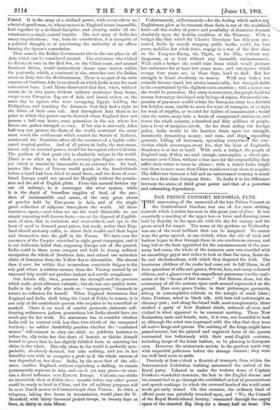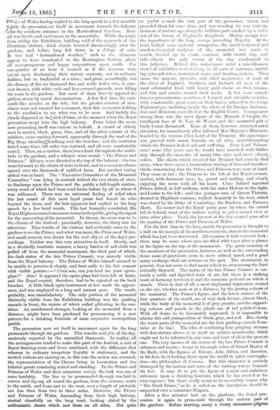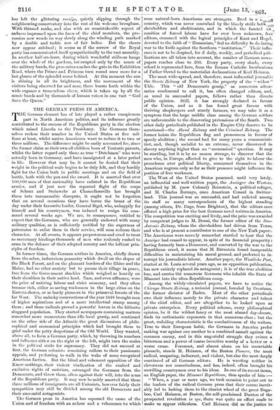THE PRINCE CONSORT MEMORIAL FETE.
THE uncovering of the memorial of the late Prince Consort at the Horticultural Gardens was one of the most striking festivals which London has seen in this great year of fetes. It was essentially a meeting of the upper ten—a levee and drawing-room held by Royalty in the open air, with the sky for canopy and the green sward for carpet. The scene at the gardens on Wednesday was one of the most brilliant that can be imagined. No sooner were the gates opened, at one o'clock, when the elite of rank and fashion began to flow through them in one continuous stream, and long before the hour appointed for the commencement of the cere- mony had come, the whole of the immense area was crowded with an assemblage gayer and richer to look at than the roses, fleurs-de- lis, and rhododendrons, with which they disputed the field. The beauteous children of the realm had come out in full bloom, in all their splendour of silks and gauzes, flowers; lace, and many-coloured ribbons, and a glance over this magnificent panorama was the reali- zation of the " dream of fair women." Not Britons alone, but the aristocracy of all the nations upon earth seemed represented on the ground. Here were grave Turks, in their picturesque garments, sitting in contemplative solitude on the margin of small lakes ; there, Persians, robed in black silk, with hats tall and straight as chimney-pots ; and along the broad walk, most conspicuously, there strolled a party of New Zealand chiefs, tattooed all over, and clothed in what appeared to be cocoanut matting. These New Zealanders, male and female, were, it is true, not beautiful to look at, although the mind was impressed with the idea that they were all native kings and queens. The matting of the kings might have passed muster, but the painted and engraved faces of the queens contrasted too ludicrously with their semi-English costume, including hoops of the latest fashion, to be pleasing to European eyes. However, the aristocratic society in the gardens made way with respectful politeness before the strange visitors ; they were too well bred even to smile.
Precisely at four o'clock a flourish of trumpets from within the International Exhibition building announced the arrival of the Royal party. Ushered in under the western dome of Captain. Fowkes's wonderful structure, the heir to the English throne and his consort had to go through the established ordeal of presentations and speech-makings, to which the crowned heads of the world must needs get early inured. On this occasion, the ordinary limit of official prose was painfully trenched upon, and "We, the Council of the Royal Horticultural Society," resounded through the empty space of the deserted Big Shop for a dreary half an hour. The Pririce of Wales having replied to the long speech in a few sensible yerds, the procession set itself in movement towards the balcony /o*r the southern entrance in the Horticultural Gardens. Here all was bustle and excitement in the meanwhile. While the music from within the Exhibition building told of the approach of the illustrious visitors, thick clouds lowered threateningly over the gardens, and before long fell down in a deluge of rain. It was real " horticultural weather," such as the elements appear to have vouchsafed to the Kensington Society, above all over-prosperous and happy corporations upon earth. For one-quarter of an hour it seemed as if the heavens were intent upon discharging their watery contents, not in ordinary fashion, but in bucketsful at a time ; and great, accordingly, was the dismay of the six thousand fine and noble ladies who, in sum- mer dresses, with white veils and lace-covered parasols, were filling the seats in the gardens. But most of them bravely opposed the pitiless storm by moral determination. A few fled into the cata- comb-like arcades at the side, but the greater number of arm- chairs were not vacated for a moment, their fair occupants holding to the resolution to see what was to be seen. And luckily the clouds dispersed at the; nick of time, at the moment when the Royal procession swept into the high balcony. From below the scene now presenting itself was curious to behold. A crowd of elderly men in scarlet, black, green, blue, and all the other colours of the rainbow, came rushing forward, apparently through the roof of the Big Shop, tsimbling:headlong over the benches ; and the confusion lasted some time, till order was restored, and all were comfortably seated. Then, on a sudden, there:was a hush throughout the multi- tude in the gardens, and a whisper went round, " The Prince and Princess." All eyes were directed to the top of the balcony ; the two went forward to the chairs of state in front, and in a moment silence spread over the thousands of uplifted faces. But another trying ordeal was at hand. The " Executive Committee of the Memorial Committee " was lying in ambush behind the two chairs of state, to discharge upon the Prince and the public a full-length oration, every word of which had been read hours before by all to whom it was addressed. There was an universal feeling of relief when the last sound of this most loyal prose had found its echo beyond the trees, and the heir-apparent had replied to the long speech by a few brief words. This last formality concluded, His Royal Highness turned once more towards the public, giving the signal for the uncovering of the memorial. In theory, the scene was to be the climax of the festival ; practically, however, the thing was far otherwise. Nine-tenths of the visitors had evidently come to the gardens to see the Prince, and what was more, the Princess of Wales, and small concern was shown for the real object of the day's pro- ceedings. Neither was this very attractive in itself. Slowly, and in a decidedly inartistic manner, a heavy lumber of sail-cloth was pulled off from the memorial monument, the chief part of which, the dark statue of the late Prince Consort, was scarcely visible from the Royal balcony. The Prince of Wales himself seemed to be unable to perceive it clearly, and bent aside to his fair consort with visible gesture :—" Cara mia, can you lend me your opera- glass?" Alas ! it appeared the opera-glass had been left at home, and the Royal request, therefore, had to be repeated on the back benches. A little black optic instrument at last made its appear- ance, and was employed in a long and earnest gaze. The result, probably, was unsatisfactory. The only portion of the memorial distinctly visible from the Exhibition building was the gushing cascade in front, the waters of which rolled glittering in the sun- shine. An uninformed stranger, looking at the memorial from a distance, might have been pardoned for pronouncing it a new pattern for a drinking fountain of some expensive metropolitan parish.
The procession now set itself in movement again for the long promenade through the gardens. This was the real fête of the day, anxiously expected by the assembled thousands. In reality, all the arrangements tended to make this part of the festival, a sort of Royal drawing-room and levee combined, with the difference that whereas in ordinary receptions Royalty is stationary, and the invited visitors are moving on, in this case the action was reversed, the representatives of the Throne being in locomotion and the inferior guests remaining seated and standing. To the Prince and Princess of Wales and their numerous cortege the task was one of some hardship. The line to be promenaded through was laid in curves and zig-zag all round the gardens, from the extreme south to the north, and from east to the west, over a length of probably not less than from two to three miles. However, the Prince and Princess of Wales, descending from their high balcony, started cheerfully on the long road, looking elated by the enthusiastic cheers which met them on all sides. Not quite so joyful seemed the first part of the procession, which had preceded them for some time, and was wending its way with the slowness of mature age along the brilliant path marked by a treble row of the fairest of England's daughters. Motley enough were the ingredients of the long cortege preceding Royalty. At the head, behind some stalwart trumpeters, the much-honoured and much-to-be-pitied sculptor of the memorial was made to march, dressed up in Court costume, with sword, wig, and tail—almost the only victim of the day condemned to this infliction. Behind this unfortunate artist a miscellaneous crowd of celebrities trotted along, in all sorts of costumes, includ- ing episcopal robes, waterproof coats, and shooting jackets. Then came the mayors, provosts, and chief magistrates of most of the cities of England, Scotland, and Ireland, all men of the most substantial kind, with heavy gold chains on their bosoms, and furs and ermine around their necks. A few more miscel- laneous processionists, members of learned and scientific societies, with comfortable great coats on their backs, ushered in the Corps Diplomatique, including nearly the whole of the foreign Ambassa - dors and .Ministers accredited at the English Court. Conspicuous among them was the erect figure of the Marquis d'Azeglio, the intelligent face of M. Van de Weyer, and the mournful gait of burly Count Bernstorff. None of them, however, attracted much attention, for immediately after followed Her Majesty's Ministers, headed by the veteran First Lord of the Treasury. His appearance was greeted with warns hurrahs on all sides, notwithstanding which the Premier looked sad and suffering. Poor Lord Palmer- ston ! some fifty years ago he would have marched with blither step through the cross-fire of merry blue eyes and sweet silvery voices. The cheers which received the l'remier had scarcely died away, when there arose a tremendous waving of hats and handker- chiefs, announcing that the Prince and Princess were near at hand. They came at last ; the Princess to the left of her Royal consort, modest, with downcast eyes; he, proud and smiling, and clearly enjoying the scene with all his heart. Close behind marched Prince Alfred, in full uniform, with his sister Helena to the right, and Louise to the left ; and two younger sons of Queen Victoria, dressed in Highland costume, walked demurely in the rear, which was closed by the Duke of Cambridge, the Duchess, and Princess Mary. No sooner had the Royal party gone by when the crowd fell in behind, most of the visitors trying to get a second view at some other place. To all, the interest of the day seemed gone after the passing of the Prince and Princess of Wales.
For the first time in the long march the procession is brought to a halt on the margin of the northern reservoir, close to the memorial which has just been uncovered. All examine it with reverent look; there may be some whose eyes are filled with tears after a glance at the figure on the top of the monument. The great majority of the members of the procession, however, as well as the surrounding dense mass of spectators, seem in more critical mood, and a good many exchange their art notions on the spot. The monument, in general, does not seem to find many admirers, even among the least critically disposed. The statue of the late Prince Consort is cer- tainly a noble and dignified work of art, but there is a striking want of harmony between it and the immense pedestal on which it stands. There is, first of all, a most unpleasant impression created on the eye, whether near or at a distance, by the jarring colours of the memorial. The Prince's figure, and the lower statues of the
four quarters of the world, are of very dark bronze, almost black, while the body of the memorial is of grey granite, and the support- ing column and panels in the plinth are of red polished stone.
With all desire to be favourably impressed, it is impossible to admire this odd juxtaposition of black, grey, and red. But clearly
the worst parts of the memorial are the four gushing cascade foun- tains at its base. The idea of combining four gurgling streams with five statues above, is in itself an artistic monstrosity, which ought not to be tolerated in any case, and least of all in the present one. The very essence of the statue of the late Prince Consort is calmness and repose ; wrapt in his ample robes of Grand Master of the Bath, with the figures of Europe, Asia, Africa, and America,
at his feet, he is looking down upon the world in quiet contempla- tion—the philosopher of Cosmos. But this character is entirely
destroyed by the motion and noise of the rushing waters beneath his feet. It may do to put the figure of a stout and ambitious alderman upon a drinking fountain which he has erected at his own expense ; but there really seems to be no earthly reason why " The Good Prince," as he is called on the inscription, should be suspended over a miniature Niagara.
After a five minutes' halt on the platform, the Royal pro- cession is again in promenade through the eastern part of the gardens. Before starting, many a weary statesman-pilgrim Las left the glittering cortege, quietly slipping through the neighbouring conservatory into the rest of his welcome brougham. With thinned ranks, and also with an unmistakeable aspect of sadness impressed upon the faces of the chief members, the pro- cession now wends its way slowly along the winding path marked by a double and treble row of fair ladies. But the cheers now appear subdued ; it seems as if the sorrow of the Royal party has communicated itself sympathetically to the vast assembly. In another half-an-hour, during which wonderful stillness hangs over the whole of the gardens, interrupted only by the music of the military bands, the procession reaches the gate in the Exhibition Road, where the Prince and Princess turn round once more for a last glance of the splendid scene behind. At this moment the sun is shining in all its brightness, and the movement of the visitors being observed far and near, there bursts forth within the wide expanse a tremendous cheer, which is taken up by all the music bands and by thousands of human voices in one vast " God Save the Queen."
































 Previous page
Previous page